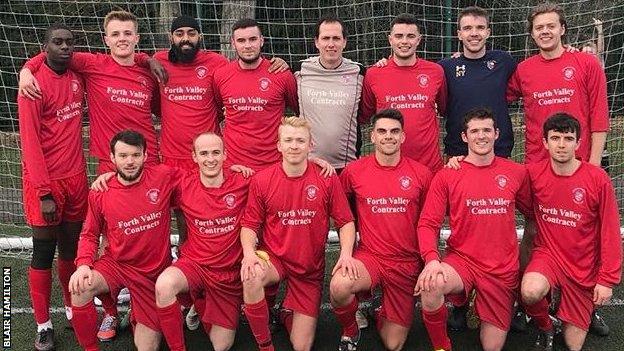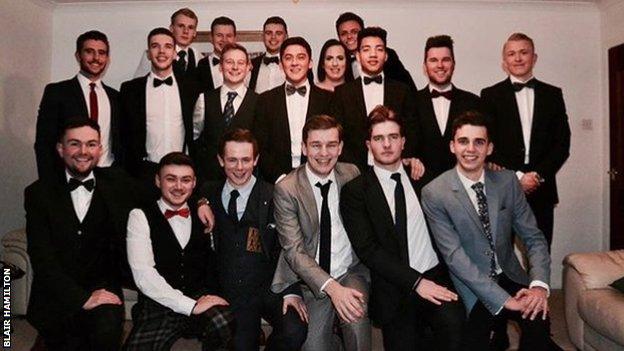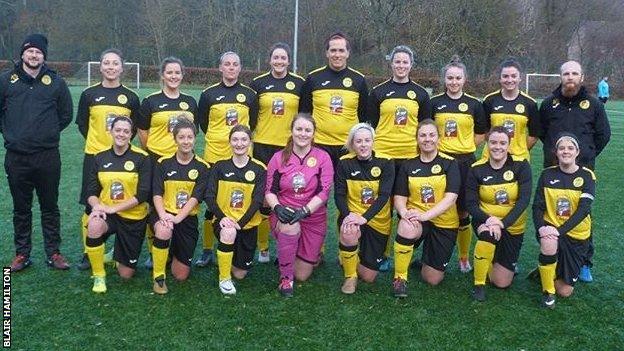Transgender debate: Scottish footballer says 'the barriers are coming down'
- Published
Transgender debate: Playing for a women’s team ‘didn’t seem possible’
Footballer Blair Hamilton says "the barriers are coming down" to transgender athletes competing in sport, after recent criticism from Martina Navratilova and Sharron Davies.
Navratilova - one of the most successful tennis players of all time - has been criticised as "transphobic" for writing that transgender women had "unfair" physical advantages over female opponents. She later apologised for using the term "cheating".
On Saturday, former British swimmer Sharron Davies told BBC Sport that many current athletes "feel the same way" as Navratilova and that trans athletes should not compete in female events to "protect women's sport".
Hamilton, who plays for Stonehaven Ladies FC in Scotland, says she has known she was transgender since she was four years old and has had hormone therapy for three years.
"They need to look at the science, what it actually does to your body," she told BBC Scotland.
"It does take away your muscle mass, your explosiveness. Your ratios from type-one to type-two fast-twitch fibres change - your body completely changes. I don't think they realise how much of a change hormone therapy makes.
"There is absolutely no advantage on the pitch."
Hamilton, 28, added: "It's been phenomenal the support I've got. Very, very easy - as much as it's been frustrating submitting paperwork and waiting - it's actually been very, very simple, which 10-15 years ago, the process wasn't.
"The opportunities are certainly there more. I'd encourage any transgender woman or man to go and play sport. The barriers are coming down, go and play."
Sharron Davies: 'Trans athletes can have physical advantage'
Hamilton's story

Hamilton as a goalkeeper for the University of Aberdeen men's team
"I knew that I was transgender since I was four," says Hamilton, who grew up on Scotland's west coast and says she had to "hide it a bit" at high school.
"When I was 14-15, I started to understand what was going on with my head and my body. I went across to the US to coach for seven years and I was married over there. I got the divorce and had to come home. After that I knew there was only one way forward and that was to transition."
Hamilton, a student at the University of Aberdeen, played for the men's team for two years as a goalkeeper, before a life-changing decision when attending a sports ball.
"I spilled my guts to the boys saying, listen, 'I can't go to the sports ball unless I go as my true self'. They were very, very supportive."
Hamilton was then asked to play for the women's team, which she says was "something I never actually thought was possible".
"If you asked me a year and a half ago, I couldn't honestly believe that's what's happened," she says.
"I was going to have to stop playing men's football because the hormones take such a toll on your body that your muscles waste away - you're not as strong, not as fast.
"Being a goalkeeper, as I was back in men's football, your reactions get slower so it was getting harder and harder to play. I was very lucky the girls' team picked me up and said 'here, you can come in'. "

Hamilton with the University of Aberdeen men's team at the sports ball, which she attended as her 'true self'
Hamilton says she has had to prove her blood testosterone levels are within a genetic female's range to Scottish Women's Football and the British Universities and Colleges Sport (BUCS), the governing body for university sport.
"As far as I know, as long as my blood levels are in that range, there's no stopping - I can go as far as I want and play at whatever level," she says.
"I've landed with my toast butter side up. I've got two very, very supportive teams.
"I was genetically born male, but the fear is when you're playing or your first training against girls, it's whether you're going to be treated any differently, but I've been very lucky."
And Hamilton says she has not experienced any transphobic abuse while playing.
"Usually after a game, girls come up to me and say, 'I'm so glad to see you play because it's making the sport more inclusive'.
"I've had no stumbling block whatsoever. We were playing for the university a couple of weeks ago and one girl at the end of the match came up and apologised to me. I was like, why are you apologising? And she said, 'Oh I said, 'man on', I wasn't meaning to be bad'.
"That's just part of the game - we all say that, it's not a big deal."

Hamilton (top row centre) with her Stonehaven Ladies team-mates
What does medicine say?
Professor John Brewer, professor of applied sport science at St Mary's University, told BBC Radio 5 Live: "Whether we like it or not, genetically the very best males will nearly always beat the very best females in most sports where physicality is critical.
"If you have those physical and physiological characteristics of a male athlete and you are competing in a female environment, then you will inevitably do extremely well and have an advantage."
Brewer says males "tend to have more testosterone" that stimulates muscle growth and their "legacy physiology" (larger heart and lungs) does not necessarily change despite the transition process.
He added: "So, inevitably, when you go into high-performance sport, where the difference between success and failure is quite small, that 'legacy physiology' alongside the muscle growth testosterone creates will give, almost inevitably, transgender athletes/individuals a physiological and indeed a performance advantage."

BBC Crossing Divides

A season of stories about bringing people together in a fragmented world.